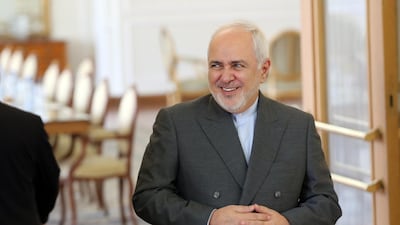Iranian Foreign Minister Mohammad Javad Zarif, after studying at some of the best American universities during the Iraq-Iran war that had hardened his bosses in Tehran, now acts as their velvet glove.
Mr Zarif, who was sanctioned by the US on Wednesday, mastered the art of dealing with the media while negotiating Iran's 2015 nuclear deal with world powers. He diverted attention from Iran's past violations of its non-proliferation commitments and presented the Iranian theocracy as a benevolent, peace-loving pluralistic system, ignoring its crushing of non-violent dissent and bans on opposition members and public freedoms.
At the same time, Iran's Revolutionary Guard Corps and Shiite militias supervised by Tehran were playing a crucial role in the Syrian regime's siege warfare and scorched earth offensives against its own population in the civil war.
Even though the Iranian regime faced a fairly united position by UN Security Council against Tehran developing a nuclear weapon, Mr Zarif made the best of a weak hand for near maximum gain, retaining Iran’s right to enrich uranium.
The US action against him is part of escalating sanctions imposed on Iran and its officials after Washington withdrew from the nuclear accord last year. The US says cash infusions from the lifting of international sanctions under the deal helped Iran further its ballistic missile programme and finance its Shiite ideological proxies in the Middle East.
Supreme leader Ayatollah Ali Khamenei, Iran's president during the 1980-88 war with Iraq, was sanctioned last month, although the current president Hassan Rouhani, a senior war planner during the 1980s conflict, has escaped US action so far.
While the sanctions will severely limit Mr Zarif’s access in the US, he remains welcome in European capitals, where he enjoys freedom of speech and unhindered media access forbidden to his compatriots in Iran.
In the West, Mr Zarif avoids the religion-infused rhetoric of the Revolutionary Guard and Mr Khamenei, who ultimately decides on foreign policy. Despite his ministerial position, he was kept in the dark about a visit by Syrian President Bashar Al Assad to Tehran in February this year, sparking a short-lived resignation.

But lately Mr Zarif's positions have been as hardline as his bosses, most notably on Syria. He has stuck to the script that Iran and Mr Al Assad are fighting only terrorists in Syria, regardless of the civilian carnage and the initial crackdown on peaceful protests in 2011 that saw thousands of non-violent Syrians killed, tortured or disappeared.
While he does not crudely support crushing dissent at home, Mr Zarif has hinted that uprisings in Iran could only occur because of infiltration by the US, even though this was not the case with the 1979 revolution that created the Islamic Republic.
He stayed silent regarding domestic oppression, most notably a Revolutionary Guard crackdown on mass demonstrations in 2009, which became known as the Green Movement, against a disputed election win for president Mahmoud Ahmadinejad.
According to Iranian dissident Akbar Ganji, at least 110 people were killed and 10,000 were arrested, although the official toll is far lower.
Many of those demonstrators 10 years ago were students who yearned for the same freedoms Mr Zarif enjoyed while studying at San Francisco State University, Columbia University and University of Denver en route to a doctorate in international law.
Mr Zarif’s exposure to the West may have tempered his outward demeanour but the 59-year old shows no hesitation in serving a regime fundamentally opposed to the kind of open society that was instrumental in honing his skills.
In announcing the sanctions on Mr Zarif, US Treasury Secretary Steve Mnuchin said: “At the same time as the Iranian regime denies Iranian citizens’ access to social media, Foreign Minister Javad Zarif spreads the regime’s propaganda and disinformation around the world through these mediums.”
Mr Zarif downplayed the US decision, saying it would have no effect because he did not have any assets outside Iran. It was a reply to the US as much as a jab at his domestic detractors who see him as too soft.
He has served the Iranian regime as well as any of them.


